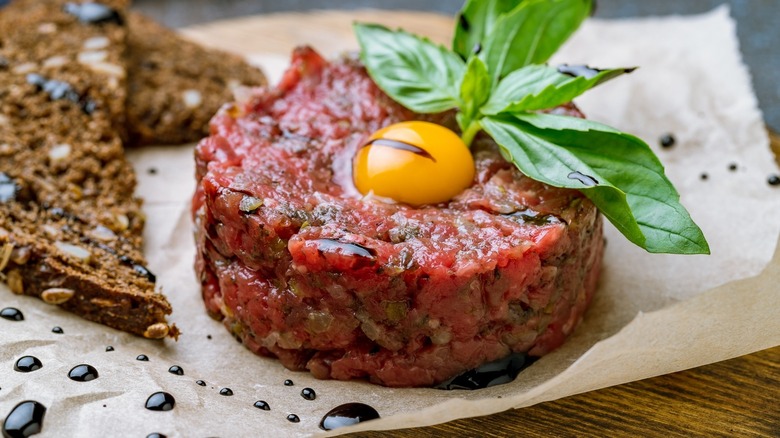The Tip To Avoid Food Poisoning From Homemade Steak Tartare
Food poisoning is always a risk if safety rules aren't followed while cooking at home. But eating raw foods like oysters, sushi, or their beefy cousin, steak tartare can be especially worrisome. However, the potential for sickness shouldn't scare you off from trying this delicious dish, especially if you take advantage of a technique commonly used to safely produce tartare in high-end restaurant kitchens.
It's a simple process that only requires a pot of boiling, salted water and a bowl or bucket of ice water. First, chefs dunk the beef into the boiling water for ten seconds, which kills off the vast majority of bacteria on the surface that can make diners sick. They then place it in the ice water, immediately halting any cooking to preserve the raw texture and character of the beef.
From here, cooks can confidently chop or mince the beef for tartare, knowing it's been safely sterilized.
Other Tartare Do's and Don'ts
It's critical to note that while the meat in tartare can resemble the texture of ground beef, you should never take a risky steak tartare shortcut and use machine-ground meat, especially the mass-produced kind available at the grocery store. That's because the process takes bacteria that would otherwise be limited to the surface of the meat and spreads it throughout the mixture. Without bringing the beef to a proper, fully cooked temperature, it's impossible to kill off enough bacteria to eat safely.
For this reason, and for the best flavor in this beef-forward dish, you'll want to ensure you're buying the best cuts possible. Do this at a real butcher if you can, not a supermarket meat department or, worse, a packaged cut from a case. This further reduces the risk of illness thanks to improved freshness and proper handling. When making home tartare, Rib 'N Reef Steakhouse suggests cuts like tenderloin, top round, top sirloin, or eye-of-round, which any quality butcher can provide. With just a few extra minutes at the butcher and a few extra seconds in the kitchen, home gourmets can dramatically lower their risk of getting sick when enjoying this tasty delicacy.

